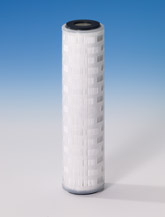Datasheets
Download:Ultipor® GF Plus filters have a pleated high area construction for long service life. The medium uses a binder resin which coats the glass fibers, imparting a positive zeta potential in aqueous service. The resin also bonds the glass fibers to a polyester substrate, producing a rugged composite medium. Applications for such turbine lube filter cartridges are numerous as most suspensions are negatively charged in aqueous solution, including not only particles but bacteria and viruses. Some Ultipor GF Plus filter grades efficiently remove sub-microscopic haze from a wide variety of pharmaceuticals and cosmetics, including colognes.
Ultipor GF Plus turbine lube filter cartridges have a fixed pore construction which precludes unloading or media migration.
Ultipor GF Plus elements with polypropylene hardware in a double open-ended UNI CAP configuration are rated to withstand differential pressures of 5.2 bard (75 psid) @ 38°C (100°F) and 3.1 bard (45 psid) @ 82°C (180°F).
When constructed in a single open-ended AB configuration, the element can withstand differential pressures of 5.2 bard (75 psid) @ 27°C (80°F) and 3.8 bard (55 psid) up to 82°C (180°F).
Ultipor GF Plus turbine lube filter cartridges have a fixed pore construction which precludes unloading or media migration.
Ultipor GF Plus elements with polypropylene hardware in a double open-ended UNI CAP configuration are rated to withstand differential pressures of 5.2 bard (75 psid) @ 38°C (100°F) and 3.1 bard (45 psid) @ 82°C (180°F).
When constructed in a single open-ended AB configuration, the element can withstand differential pressures of 5.2 bard (75 psid) @ 27°C (80°F) and 3.8 bard (55 psid) up to 82°C (180°F).
Removal ratings
| Cartridge Grade | Liquid Service3 Rating in Microns at % Efficiency 99%_______________99.98% |
Aqueous Clean Pressure Drop Per 25.4 cm (10 in) Module (MBARD/LPM) / (PSID/GPM)4 | Typical Aqueous Flow Per 25.4 cm (10 in) Cartridge (LPM/GPM) | |
| U010Z | 0.62 | 1 | 3.09 / 0.17 | 7.6 - 11.4 / 2-3 |
| U2-20Z | 0.82 | 2 | 2.55 / 0.14 | 7.6 - 11.4 / 2-3 |
| U030Z | 2.0 | 3 | 1.82 / 0.10 | 7.6 - 11.4 / 2-3 |
| U6-40Z | 3.2 | 6 | 0.91 / 0.05 | 11.4 - 18.9 / 3-5 |
| U100Z | 6.0 | 10 | 0.55 / 0.03 | 11.4 - 18.9 / 3-5 |
| U200Z | 17.0 | 20 | 0.36 / 0.02 | 11.4 - 18.9 / 3-5 |
| U400Z | 25.0 | 40 | 0.27 / 0.015 | 15.1 - 26.5 / 4-7 |
Filter Cartridges
DOE - Pall Part Number = PUY [1] [2] [3]
SOE - Pall Part Number = AB [1] [2] [4] [5]
Table 1| Code | Cartridge lengths (cm/in) |
| 10 | 25.4 / 10 |
| 20 | 50.8 / 20 |
| 30 | 76.2 / 30 |
| 40 | 102 / 40 |
Table 2
| Code | Cartridge |
| U010Z | U010Z |
| U2-20Z | U2-20Z |
| U030Z | U030Z |
| U6-40Z | U6-40Z |
| U100Z | U100Z |
| U200Z | U200Z |
| U400Z | U400Z |
Table 3
| Code | Gasket option |
| J | Ethylene propylene (std) |
| H13 | Nitrile |
| H | Fluorocarbon elastomer |
Table 4
| Code | End Fittings | |
| O-ring fitting I.D. (In) |
O-ring replacement size |
|
| 3, 8 | 1 1& ⁄4 | -222 |
| 7 | 1 1& ⁄2 | -222 |
Table 5
| Code | O-ring option |
| JH4 | Silicone |
| H | Fluorocarbon elastomer |
| J | Ethylene propylene |
Housing Information
Housings are available in either polypropylene, carbon steel, or stainless steel and can accommodate 1 to 152, 10 in modules per housing.1 These grades are particularly useful as prefilters, in addition to providing absolute removal efficiency.
2 Extrapolated value.
3 Liquid service ratings are based on a modified OSU F-2 protocol for recording removal efficiency based on particle counting techniques.
4 Pressure drop in MBARD/LPM (PSID/GPM) for water for a single 25.4 cm (10 in) module. Multiply this value by the required flow to determine the total aqueous pressure drop. Next, for fluids other than water, multiply by viscosity in centipoise. If this calculated pressure drop is excessive, then divide this value by the number of 25.4 cm (10 in) modules required to reduce this pressure drop to an acceptable level.
We appreciate your review of this product. Please login to your account to leave a review.



